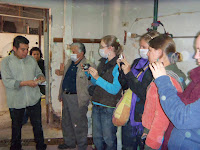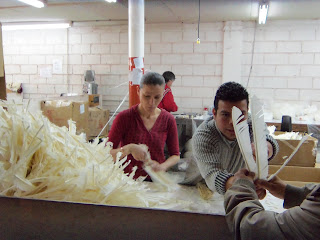During our time in the border town of Agua Prieta, our group visited Gateway Feathers, a Maquila (U.S. run factory on the Mexico side of the border. Similar types of U.S. run factories can be found throughout the world). The reason these factories operate in other countries is because its cheaper for many companies to pay wages in other countries, even with the additional shipping cost of getting the product back to the U.S. There are many maquilas along the U.S. Mexico Border, and since NAFTA of 1994, these factories employ a huge number of people in Mexico. However, the conditions at these maquilas are difficult, the pay is low, and many maquilas create environmental problems. At the factory we visited, workers cut turkey feathers into tiny brightly colored pieces used in bows and arrows. The Maquila was relatively small. Conditions seemed surviveable for the hour or so which we visited, but the overpowering reek of chemical dyes created a need for face masks, and Olivia, the almost 1 year old traveling with us, was not allowed to come into the factory because of these chemicals. Our group watched a documentary, "Maquilopolis," that tells the story of terrible working and living conditions, including lead contamination in the air in Tijuana. The film explained that women make up 80% of the Maquila workforce. The women in the film at the end spoke of their hope, "My hope is someday there will be factories that don't pollute the environment." You can learn more about Maquilas in general by watching that film or through reading on wikipedia: http://en.wikipedia.org/wiki/Maquiladora. To learn more about NAFTA, read the Mechanisms section: http://en.wikipedia.org/wiki/North_American_Free_Trade_Agreement
Veronica, a warm, smile filled mother of 2 who is a supervisor at the plant, gave us a tour of the relatively small maquila. Although the working conditions weren't great, she told us she was glad to have the work. From our perspective, wearing face masks barely masked the naseuating smell of chemical dye, and we wondered how she managed on the salary: a full days' work earns 100-180 pesos, or about 8 to 16 dollars.


In the first room we entered, women and men sat at counters, doing precise-looking work at microscope-like instruments. Others were in the corner, facing a wall and counter where they inspected the finished feather for quality control and bagged them. The room was a noisy whirl with the sound of clipping, stacking, buzzing, and the blare of the radio, playing a bouncy pop tune that contrated a longing heartbroken voice. Trash cans were filled with leftover colorful pieces of feathers, and garbage bags were filled to the brim with white feathers, either freshly dyed or ready to be dyed.
In another room, there were large dryers where huge loads of feathers tumbled dry. We walked outside into welcome fresh air for just a minute before we went into another building. There a disgusting, overpowering, glue-like smell easily leaked through my face mask, making me naseous. A strong man in army pants stood mixing a vat a of bright green dye and feathers. We learned it takes 1-1.5 hours to dye the feathers. We walked through another room where women sorted feathers according to size. Work, work, work, buzz, buzz, buzz, clip, clip, clip, stack, stack, stack, sing, stack, stack, stack, dye, dye, dye. A constant steady swirl of work, from 7-5 p.m. Monday thru Friday, sometimes overtime, and sometimes Saturdays. All of this for 8-16 dollars per day.
A message from the company's website explains: "All of our dye materials and packaging products are purchased in the United States and are certified environmentally safe. We then ship all of these products to our factory in Mexico to complete our manufacturing process. This is done to hold down the cost of feather processing, a savings which is passed on to the consumer." How far do we go to benefit our consuming habits when we know that they compromise the quality of life for someone else? Would paying a few extra cents or dollars be worth it? How can we encourage companies to pursue efficiency without sacrificing basic human dignity?
Many people advocate boycotting companies with poor labor conditions. This is a powerful way to become a more conscious consumer and sends a strong message to money conscious companies. At the same time, when asked about message she would like to share, Veronica, the working woman who was giving us a tour, didn't know, and hesitantly said, "well..buy more feathers?" While we can boycott companies, its also important to realize that our current economy depends on them, and they aren't going to disappear overnight. We can also tell companies we expect specific improvements and standards to be upheld, and we can obligate our governments to provide oversight. We can write the company or another company which we buy goods from and ask them to pay minimum U.S. wage to their workers, & provide healthcare, and social security for them. Another thing we can demand is that at a minimum U.S. companies follows U.S. safety and health codes even though the company operates in another country with a different set of standards. To learn more about the company which the maquila we visited is part of, visit http://www.gatewayfeathers.com/.







No comments:
Post a Comment